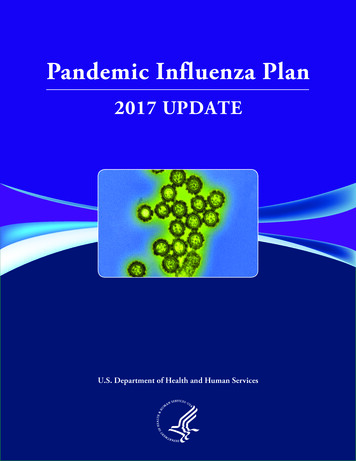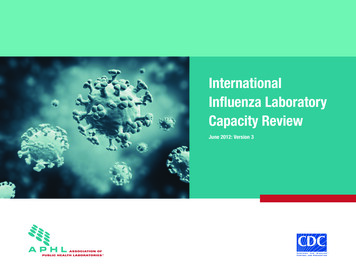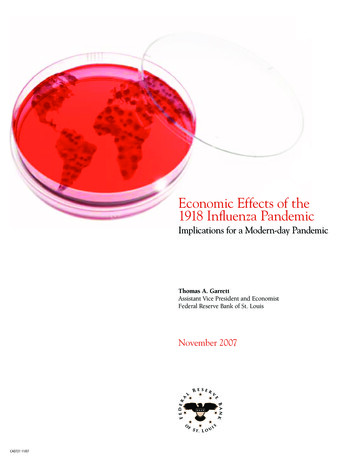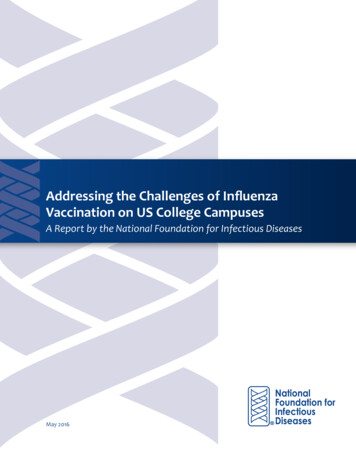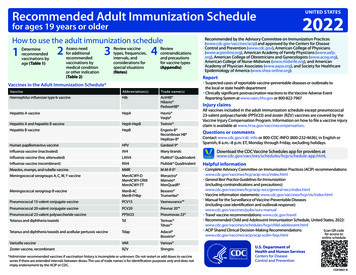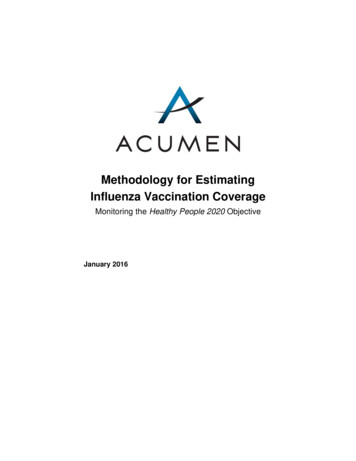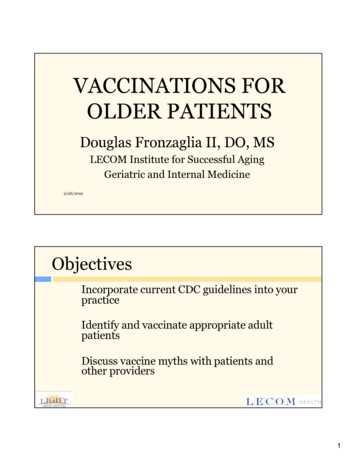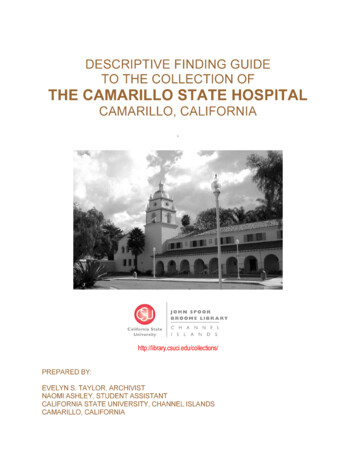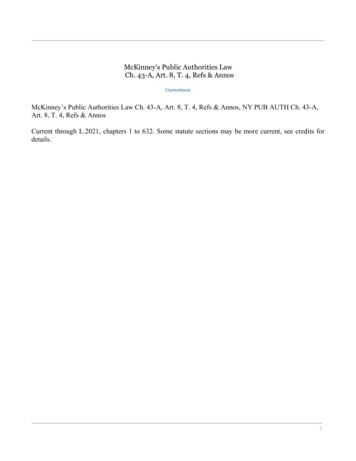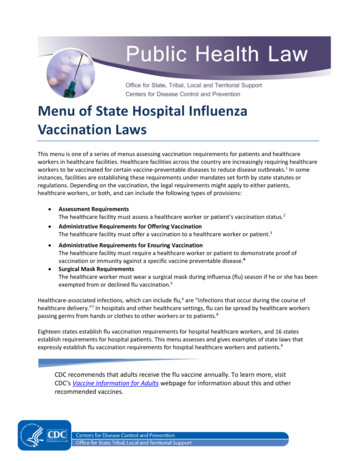
Transcription
Menu of State Hospital InfluenzaVaccination LawsThis menu is one of a series of menus assessing vaccination requirements for patients and healthcareworkers in healthcare facilities. Healthcare facilities across the country are increasingly requiring healthcareworkers to be vaccinated for certain vaccine-preventable diseases to reduce disease outbreaks.1 In someinstances, facilities are establishing these requirements under mandates set forth by state statutes orregulations. Depending on the vaccination, the legal requirements might apply to either patients,healthcare workers, or both, and can include the following types of provisions: Assessment RequirementsThe healthcare facility must assess a healthcare worker or patient’s vaccination status.2Administrative Requirements for Offering VaccinationThe healthcare facility must offer a vaccination to a healthcare worker or patient.3Administrative Requirements for Ensuring VaccinationThe healthcare facility must require a healthcare worker or patient to demonstrate proof ofvaccination or immunity against a specific vaccine preventable disease.4Surgical Mask RequirementsThe healthcare worker must wear a surgical mask during influenza (flu) season if he or she has beenexempted from or declined flu vaccination.5Healthcare-associated infections, which can include flu,6 are “infections that occur during the course ofhealthcare delivery.”7 In hospitals and other healthcare settings, flu can be spread by healthcare workerspassing germs from hands or clothes to other workers or to patients.8Eighteen states establish flu vaccination requirements for hospital healthcare workers, and 16 statesestablish requirements for hospital patients. This menu assesses and gives examples of state laws thatexpressly establish flu vaccination requirements for hospital healthcare workers and patients.9CDC recommends that adults receive the flu vaccine annually. To learn more, visitCDC’s Vaccine Information for Adults webpage for information about this and otherrecommended vaccines.[Cite your source here.]
Hospital Healthcare Worker Flu Vaccination LawsEighteen states establish flu vaccination requirements for hospital healthcare workers.10 These lawsestablish requirements based on the hospital type and the type of vaccination requirements. In addition,some state laws allow for vaccination exemptions.Examples by Hospital TypeHospitals are healthcare facilities that provide inpatient, diagnostic, and therapeutic services, for bothsurgical and non-surgical conditions, 24 hours a day.11 Seventeen states’ healthcare worker flu vaccinationlaws refer to hospitals generally.12 However, two states have laws that are specific to general acute carehospitals.13All Hospitals14 Maine law requires that hospitals “adopt and implement a policy that recommends and offersannual immunization against seasonal influenza to all personnel who provide direct care toresidents of the facility.”15General Acute Care Hospital16 Under California law, "[e]ach general acute care hospital shall require its employees to bevaccinated, or if the employee elects not to be vaccinated, to declare in writing that he or she hasdeclined the vaccination.”17Examples by Requirement TypeTen states establish flu vaccination assessment requirements for hospital healthcare workers.18 Elevenstates require hospitals to offer flu vaccination to healthcare workers.19 Eight states require hospitals toensure that healthcare workers are vaccinated against influenza.20 Three states require hospital healthcareworkers to wear surgical masks during flu season if they have been exempted from or declinedvaccination.21Assessment New York law requires that hospitals “document the influenza vaccination status of all personnelfor the current influenza season in each individual's personnel record or other appropriaterecord.”22Under Utah law, hospitals must report “the total number of HCWs and the number of thoseworkers who are documented to have received an influenza vaccine for the current influenzaseason.”23Administrative Offer Per Nebraska law, “[e]ach general acute hospital shall . . . [a]nnually offer onsite influenzavaccinations to all hospital employees.”24Administrative Ensure Under Massachusetts law, hospitals “shall ensure that all personnel are vaccinated with seasonalinfluenza vaccine unless an individual declines vaccination.”252
Surgical Mask Rhode Island law states that healthcare workers who are not immunized “be required during anydeclared period in which flu is widespread—as part of his or her professional licensing obligation—to wear a surgical face mask for the duration of each direct patient contact in the performance ofhis or her duties at any health care facility.”26Examples by Exemption TypeStates with flu vaccination requirements often explicitly permit exemptions from these requirements incertain circumstances,27 such as when vaccination is medically contraindicated or violates a person’sreligious or philosophical beliefs.28 Eleven states permit medical exemptions for vaccination requirements,29four states permit religious exemptions, and ten states permit philosophical exemptions.30Medical Per Maine law, “[a]n employee who does not meet the immunization/immunity requirement maybe permitted to attend work [if] . . . [t]he employee presents . . . a physician’s written statementthat immunization against one or more of these diseases is medically inadvisable.”31Religious New Hampshire requires hospitals to “provide to its consenting employees annual immunizationsagainst influenza . . . subject to exemptions for medical contraindications and religious beliefs.”32Philosophical Under Massachusetts law, hospitals “shall ensure that all personnel are vaccinated with seasonalinfluenza vaccine unless an individual declines vaccination.”33Rhode Island law states that an “[a]nnual influenza vaccination is required for all health careworkers” and requires hospitals to track the “number of health care workers who decline annualinfluenza vaccination for medical or personal reasons.”34Hospital Patient Flu Vaccination LawsSixteen states establish flu vaccination laws for hospital patients.35 These laws establish requirements basedon the hospital and patient categories and the type of vaccination requirements. In addition, state lawssometimes allow for vaccination exemptions.Examples by Hospital TypeThe patient flu vaccination laws in 14 states refer to hospitals generally.36 However, two states have lawsthat are specific to general acute care hospitals.37 In addition, one state has flu vaccination laws that arespecific to patients at a university hospital;38 another state has flu vaccination laws that are specific toparents of patients in a neonatal unit of a hospital.39All Hospitals40 Ohio law requires that “[e]ach hospital shall offer to each patient who is admitted to the hospital. . . vaccination against influenza.”41CDC recommends that healthcare workers receive the flu vaccine annually. To learnmore, visit the CDC’s Recommended Vaccines for Healthcare Workers webpage forinformation about this and other recommended vaccines.[Cite your source here.]3
General Acute Care Hospital42 Under Nebraska law, “[i]n order to prevent, detect, and control pneumonia and influenzaoutbreaks in Nebraska, each general acute hospital . . . shall annually, beginning no later thanOctober 1 and ending on the following April 1, offer onsite vaccinations for influenza andpneumococcal disease to all residents and to all inpatients prior to discharge.”43University Hospital Illinois law requires that the University of Illinois Hospital develop “[p]rocedures for offeringimmunization against influenza virus when available between September 1 and April 1” to patientsaged 65 years or older.44Hospital Neonatal Unit Under New York law, “[i]t shall be the duty of each general hospital . . . with a neonatal intensivecare unit to offer, annually between September first and April first, to every parent or person inparental relation who is reasonably anticipated to be a caregiver in the household of a newbornbeing treated in the neonatal intensive care unit vaccination against influenza virus.”45Examples by Patient TypeFour states establish flu vaccination laws for all hospital patients.46 Other states have vaccination laws forpatients particularly vulnerable to flu. Thirteen states establish flu vaccination laws for patients aged 65years or older.47 Two states establish flu vaccination laws for at-risk patients as identified by the hospital.48One state establishes flu vaccination laws for parents of patients in hospital neonatal units.49All Patients Ohio law requires that “[e]ach hospital shall offer to each patient who is admitted to thehospital . . . vaccination against influenza, unless a physician has determined that vaccination of thepatient is medically inappropriate.”50Patients Aged 65 Years or Older Under Georgia law, “[p]rior to discharging any inpatient who is 65 years of age or older, a hospitalshall offer the inpatient vaccinations for the influenza virus and pneumococcal disease inaccordance with the recommendations of [CDC].”51Patients at Risk Illinois requires that every hospital adopt a flu immunization policy that includes “[p]rocedures foridentifying patients age 65 or older and, at the discretion of the facility, other patients at risk” and“[p]rocedures for offering immunization against influenza virus.”52Parents of Patients in Hospital Neonatal Unit Under New York law, “[i]t shall be the duty of each general hospital . . . with a neonatal intensivecare unit to offer, annually between September first and April first, to every parent or person inparental relation who is reasonably anticipated to be a caregiver in the household of a newbornbeing treated in the neonatal intensive care unit vaccination against influenza virus.”534
Examples by Requirement TypeSeven states have flu vaccination assessment requirements for certain hospital patient types.54 Sixteenstates require hospitals to offer flu vaccination to hospital patients.55 One state requires hospitals to ensurepatients are vaccinated for flu.56Assessment Texas law requires “that the person administering the vaccine ask the elderly patient if they arecurrently vaccinated against influenza.”57Administrative Offer Florida law states that hospitals must “implement a program to offer immunizations against theinfluenza virus and pneumococcal bacteria to all patients age 65 or older.”58Administrative Ensure New Hampshire law requires hospitals to “immunize all consenting patients for influenza.”59Examples by Exemption TypeThirteen states explicitly permit hospital patients to be exempted from receiving flu vaccination for medicalreasons.60 One state permits a religious exemption61 and four permit philosophical exemptions.62Medical Louisiana law states that hospitals must offer flu vaccination “to all inpatients sixty-five years of ageand older, prior to discharge, unless contraindicated.”63Religious New Hampshire law states that “[i]mmunization of all consenting patients shall be subject toexemptions for medical contraindications and religious beliefs.”64Philosophical Under California law, “[n]o person who has been offered the vaccine as required under this chaptermay receive either an influenza vaccine . . . if . . . [r]eceipt of the vaccine is against the resident'spersonal beliefs.”65Hospital Patient Vaccination Requirements: Flu and PneumococcalFlu vaccination requirements are often established in conjunction with pneumococcal vaccinationrequirements. The inner circle below indicates states with both flu and pneumococcal vaccination lawsfor hospital patients. The outer circle indicates states with flu vaccination laws only.Mississippi andMissouriCalifornia, Florida,Georgia, Illinois,Louisiana,Nebraska, NewHampshire, NewJersey, New York,Ohio,Pennsylvania,Tennessee, andTexasFor more information about hospital pneumococcal vaccination requirements, see the Public HealthLaw Program’s Menu of State Hospital Pneumococcal Vaccination Laws.5
Acknowledgments and DisclaimersThis document was developed by Alexandra Bhatti, JD, MPH, contractor, Cherokee Nation Assurance, LLC;Aila Hoss, JD, former contractor, Carter Consulting, Inc.; Dawn Pepin, JD, MPH, contractor, Cherokee NationAssurance, LLC; and Jennifer Black, JD, Emory Public Interest Fellow, with the Public Health Law Program(PHLP) within CDC’s Office for State, Tribal, Local and Territorial Support. This document was produced incollaboration with CDC’s National Center for Immunization and Respiratory Diseases. The authors wouldlike to thank Lindsay Culp, JD, MPH, Megan Lindley, MPH, and Matthew Penn, JD, MLIS, for their researchand editorial assistance.For further technical assistance with this inventory, please contact phlawprogram@cdc.gov. PHLP providestechnical assistance and public health law resources to advance the use of law as a public health tool. PHLPcannot provide legal advice on any issue and cannot represent any individual or entity in any matter. PHLPrecommends seeking the advice of an attorney or other qualified professional with questions regarding theapplication of law to a specific circumstance. The findings and conclusions in this summary are those of theauthors and do not necessarily represent the official views of CDC.This menu includes states laws collected from WestlawNext during January 14–19, 2015.Published November 19, 2015 & updated October 2017.Author’s note:Updates include the change of Ensure Requirement definition from “requiring a healthcare facility toensure that a healthcare worker or patient has been vaccinated, unless vaccination is specifically exemptedor declined” to “the healthcare facility must require a healthcare worker or patient to demonstrate proof ofvaccination or immunity against a specific vaccine preventable disease”. This change did not alter thecoding results. Updates also include change in the interpretation of Offer Requirement such that an offerincludes conditions whereby a facility is required to offer, provide, make available, arrange for vaccination,or similar language that results in the facility being responsible for providing the individual the opportunityto receive the vaccination. This did change the coding results; offer requirements identified based on thischange are indicated by a dagger†.6
Appendix 1Hospital Healthcare Worker Influenza Vaccination LawsHospital TypeStateCACitationWest’s Ann. Cal. Health & Safety Code § 1288.7(a)West’s Ann. Cal. Health & Safety Code §1288.45(c)*West’s Ann. Cal. Health & Safety Code § 1250(a)*West’s Ann. Cal. Health & Safety Code § 1288.8(b)West’s Ann. Cal. Health & Safety Code §1288.45(c)*West’s Ann. Cal. Health & Safety Code § 1250(a)*Cal. Code Regs. tit. 8, §§ 5199(a)(1), (c)(6)(D),(c)(7)(H), (h)(5)(D)(10)Cal. Code Regs. tit. 8, App. C2Cal. Code Regs. tit. 8, App. ECOGAILMEMDMANENHAllHospitals666 Colo. Code Regs. 1011-1:II-10.6, 10.7, 10.86 Colo. Code Regs. 1011-1:IV-2.100(9)*Ga. Code Ann. § 31-7-18(b)Ga Comp. R. & Regs. 111-8-40-.02(f)*Ill. Admin. Code tit. 77, § 956.30Ill. Admin. Code tit. 77, § 956 App. AIll. Admin. Code tit. 77, § 956.10*210 Ill. Comp. Stat. 85/3(A)*10-144 Me. Code R. Ch. 264, § 2(C), (D)10-144 Me. Code R. Ch. 264, § 310-144 Me. Code R. Ch. 264, § 1(D)*22 Me. Rev. Stat. Ann. § 1843(4)*Md. Code Regs. 10.07.01.34(F)(5)Md. Code Regs. 10.07.01.01(B)(13)*105 Mass. Code Regs. 130.325(B),(C)105 Mass. Code Regs. 130.020*Neb. Rev. St. § 71-467Neb. Rev. St. § 71-412*N.H. Rev. Stat. Ann. § 151:9-b(IV)N.H. Rev. Stat. Ann. § 151:2(I)(a)*N.H. Rev. Stat. Ann. § 151-C:2(XX)*N.H. Rev. Stat. Ann. § 151:33(II)(b)N.H. Rev. Stat. Ann. § 151:2(I)(a)*N.H. Rev. Stat. Ann. § 151-C:2(XX)*GeneralAcute Care67Requirement XXXXXXXXXX73XXXXXXXXXXXXX†XX74XXXXX
NVNYOHOKORRISCTNUTN.H. Code Admin. R. He-P 309.02(b)N.H. Code Admin. R. He-P 309.01(h)*N.H. Rev. Stat. Ann. § 151-C:2(XX)*N.H. Code Admin. R. He-P 309.08(b)N.H. Code Admin. R. He-P 309.01(h)*N.H. Rev. Stat. Ann. § 151-C:2(XX)*N.H. Code Admin. R. He-P 802.21(h)N.H. Code Admin. R. He-P 802.03(ai)*N.H. Rev. Stat. Ann. § 151-C:2(XX)*Nev. Admin. Code § 439.935Nev. Rev. Stat. Ann. § 439.805*Nev. Rev. Stat. Ann. § 449.012*10 N.Y. Comp. Codes R. & Regs. 2.59(c), (d), (f)N.Y. Pub. Health Law § 2801(1) (McKinney)*10 N.Y. Comp. Codes R. & Regs. 405.3(b)(10)(v)N.Y. Pub. Health Law § 2801(1) (McKinney)*Ohio Admin. Code 3701-14-03Ohio Admin. Code 3701-14-04Ohio Admin. Code 3701-14-04, App. AOhio Admin. Code 3701-14-04, App. BOhio Admin. Code 3701-14-01(A)(8)*Ohio Rev. Code Ann. § § 3727.01(B)(2)*Okla. Admin. Code § 310:667-5-4(e)Okla. Admin. Code § 310:667-1-2*Okla. Stat. tit. 63, § 1-701(1)*Or. Admin. R. 333-018-0127Or. Admin. R. 333-018-0100(18)*Or. Rev. Stat. Ann. § 442.015(15)*31 R.I. Code R. 1-22:3.5.431 R.I. Code R. 1-22:5.031 R.I. Code R. 1-22:1.0*31 R.I. Code R. 1-22:2.0*31 R.I. Code R. 1-22:1.6*31 R.I. Code R. 1-22:2.1(a)*31 R R.I. Code R. 4-18:1.27*S.C. Code Ann. Regs. 61-16 § 602(C)S.C. Code Ann. Regs. 61-16 § 101(E)*Tenn. Comp. R. & Regs. 1200-08-01-.06(3)(f)Tenn. Comp. R. & Regs. 1200-08-01-.01(37)*Utah Admin. Code R386-705Utah Code Ann. 1953 § XXXXXX76XXXXXXXXXXXX80XX*Provision includes definition.†Note that this was added as part of the broadened offer requirement change in the September 2017 update.8
Appendix 2Hospital Patient Influenza Vaccination LawsHospital TypeStateCitationAllHospitals81CAWest’s Ann. Cal. Health &Safety Code § 1288.8(b)West’s Ann. Cal. Health &Safety Code § 1288.45(c)*West’s Ann. Cal. Health &Safety Code § 1250(a)*West’s Ann. Cal. Health &Safety Code § 120392.9West’s Ann. Cal. Health &Safety Code § 120392.6West’s Ann. Cal. Health &Safety Code § 1250(a)*FLFla. Stat. Ann. § 381.005(2)Fla. Stat. Ann. § 395.002(12)*GAGa. Code Ann. § 31-7-18(a)Ga Comp. R. & Regs. 111-8-40.02(f)*Ga Comp. R. & Regs. 111-8-40.20(f)Ga Comp. R. & Regs. 111-8-40.02(f)*210 Ill. Comp. Stat. 85/6.26210 Ill. Comp. Stat. 85/3(A)*LAMSIll. Admin. Code tit. 77, §250.330(a)(1)Ill. Admin. Code tit. 77, §250.100*210 Ill. Comp. Stat. 85/3(A)*La. Rev. Stat. Ann. §40:2023(1)La. Rev. Stat. Ann. §40:2102(A)*Miss. Code Ann. § 41-9-39(1)Miss. Code Ann. § nts65 YearsofAgePatientsat RiskXRequirement TypeParents XXXX86XReligiousPhilosophical84XX110 Ill. Comp. Stat. 330/8ILUniversityHospitalPatient TypeXXX85XXXXXXXXXXXXXXXXXXXXXX9
MOMo. Ann. Stat. § 197.168Mo. Ann. Stat. § 197.020*NENeb. Rev. St. § 71-468Neb. Rev. St. § 71-412*NHN.H. Rev. Stat. Ann. § 151:9b(I)N.H. Rev. Stat. Ann. §151:2(I)(a)*N.H. Rev. Stat. Ann. § 151C:2(XX)*N.H. Rev. Stat. Ann. §151:33(II)(b)N.H. Rev. Stat. Ann. §151:2(I)(a)*N.H. Rev. Stat. Ann. § 151C:2(XX)*N.H. Code Admin. R. He-P309.02(b)N.H. Code Admin. R. He-P309.01(h)*N.H. Rev. Stat. Ann. § 151C:2(XX)*N.H. Code Admin. R. He-P309.08(b)N.H. Code Admin. R. He-P309.01(h)*N.H. Rev. Stat. Ann. § 151C:2(XX)*N.H. Code Admin. R. He-P802.21(h)N.H. Code Admin. R. He-P802.03(ai)*N.H. Rev. Stat. Ann. § 151C:2(XX)*NJNYOHN.J. Admin. Code 8:43G-14.6N.J. Admin. Code 8:43G-1.2*N.Y. Pub. Health Law § 2805h(2) (McKinney)N.Y. Pub. Health Law § 2801(1)(McKinney)*N.Y. Pub. Health Law § 2805h(3) (McKinney)N.Y. Pub. Health Law § 2801(1)(McKinney)*Ohio Rev. Code Ann. §3727.19(B)Ohio Rev. Code Ann. XXXXX90XXXXXXXXXXXXXXXXXXXXOROr. Rev. Stat. § 441.816Or. Rev. Stat. § 442.015*XXPA35 Pa. Cons. Stat. Ann. § 634.335 Pa. Cons. Stat. Ann. §634.2*XXXXXXXXX†X87XXX10
35 Pa. Cons. Stat. Ann. §448.802a*TNTXTenn. Code Ann. § 68-11-266Tenn. Code Ann. § 68-11201(26)(A)*Tenn. Comp. R. & Regs. 120008-01-.06(3)(g)Tenn. Comp. R. & Regs. 120008-01-.01(37)*25 Tex. Admin. Code §133.45(h)(1), (2)25 Tex. Admin. Code §133.2(19),(22)*Tex. Health & Safety Ann.Code § 161.0052(b)Tex. Health & Safety Ann.Code § on includes definition.†Note that this was added as part of the broadened offer requirement change in the September 2017 update.11
Alexandra Stewart et al. Mandatory Vaccination of Health-Care Personnel: Good Policy, Law, and Outcomes, 53Jurimetrics J. 341 (April 2013).2MC Lindley, GA Horlick, AM Shefer, FE Shaw & Gorji, M. (2007). Assessing State Immunization Requirements forHealthcare Workers and Patients. Am. j. of preventive med., 32(6), 459–65, 460.3Id.4Id.5See, e.g., 10 N.Y. Comp. Codes R. & Regs. 2.59; 31 R.I. Code R. 1-22:5.0.6Diseases and Organisms in Healthcare Settings, Centers for Disease Control and sms.html (last visited Oct. 9, 2015).7Tara Ramanathan and Matthew Penn, The Emergence of Law to Address Healthcare-Associated Infections, AmericanHealth Lawyers Association Connections, 28 (Aug. 2012).8Prevention Strategies for Seasonal Influenza in Healthcare Settings, Centers for Disease Control and fectioncontrol/healthcaresettings.htm (last visited Oct. 13. 2015).9CDC’s Public Health Law Program conducted a search for state statutes and regulations that establish expressinfluenza vaccination requirements for hospitals healthcare workers and patients using WestlawNext, a legal researchdatabase. Searches were conducted in all states and the District of Columbia between January 14–19, 2015 andupdated between March 24-29, 2016. This assessment did not capture state requirements that incorporate CDCvaccination recommendations by reference. Laws regarding childhood vaccinations, school vaccinations, immunizationregistries, blood, tissue, and organ donor requirements, post-exposure vaccinations, physician standing orders, andprimary care providers and individual healthcare provider requirements to vaccinate patients were not within thescope of this assessment. Laws establishing vaccination requirements as a condition for participation in a health planwere also excluded.10California, Colorado, Georgia, Illinois, Maine, Maryland, Massachusetts, Nebraska, Nevada, New Hampshire, NewYork, Ohio, Oklahoma, Oregon, Rhode Island, South Carolina, Tennessee, and Utah. See appendix 1 for citations. Note,Colorado law states that “[i]f a licensed healthcare entity demonstrates that it has vaccinated a targeted percentage ofits employees in a given year, using its own methodology, it shall be exempt from the [administrative and surgicalmask] requirements.” 6 Colo. Code Regs. 1011-1:II-10.6.11For definitions of “hospital” in state law, see, e.g., West’s Ann. Cal. Health & Safety Code § 1250; Fla. Stat. Ann.§ 395.002(12); Ga. Comp. R. & Regs. 111-8-40-.02(f); La. Rev. Stat. Ann. § 40:2102(A). Laws regarding psychiatrichospitals were excluded from the assessment. See, e.g., N.Y. Comp. Codes R. & Regs. tit. 14, § 509.4.12California, Colorado, Georgia, Illinois, Maine, Maryland, Massachusetts, Nevada, New Hampshire, New York, Ohio,Oklahoma, Oregon, Rhode Island, South Carolina, Tennessee, and Utah. See appendix 1 for citations. The legalprovisions in the “all hospitals” category include laws which reference hospitals generally. Therefore, in some statesthe “all hospitals” provisions may also be applicable to specialty and general acute care hospitals, but have beencoded only as “all hospitals.” See, e.g., Utah Admin. Code R386-705, which establishes healthcare worker vaccinationassessment requirements, and Utah Code Ann. 1953 § 26-21-2, which includes definitions of both general acute careand specialty hospitals. Citations defining “hospital” in state law are provided in the appendices for reference. Note,Colorado law states that “[i]f a licensed healthcare entity demonstrates that it has vaccinated a targeted percentage ofits employees in a given year, using its own methodology, it shall be exempt from the [administrative and surgicalmask] requirements.” 6 Colo. Code Regs. 1011-1:II-10.6.13California and Nebraska. See appendix 1 for citations. The provisions in this category specifically reference “generalacute care hospitals” thus these provisions may not apply to other types of specialty hospitals. States that definehospitals as providing acute care or treating acute illness did not meet the threshold of a “general acute carehospital.” See, e.g., 22 Me. Rev. Stat. Ann. § 1843(4); S.C. Code Ann. Regs. 61-16 § 101(E); Tenn. Comp. R. & Regs.1200-08-01-.01(37). Where available, citations defining “general acute hospital” in state law are provided forreference in the appendices.14See endnote 12 for description of “all hospitals” category.1510-144 Me. Code R. Ch. 264, § 2(C).16See endnote 13 for description of “general acute care hospitals” category.17West's Ann. Cal. Health & Safety Code § 1288.7(a).1
California, Colorado, Maine, New Hampshire, Nevada, New York, Ohio, Oregon, Rhode Island, and Utah. Seeappendix 1 for citations. N.M. Stat. Ann. § 24-29-5 was considered a voluntary assessment requirement and thusexcluded from the assessment.19California, Colorado, Georgia, Illinois, Maine, Maryland, Nebraska, New Hampshire, Oklahoma, South Carolina, andTennessee. See appendix 1 for citations. Note, Colorado law states that “[i]f a licensed healthcare entity demonstratesthat it has vaccinated a targeted percentage of its employees in a given year, using its own methodology, it shall beexempt from the [administrative and surgical mask] requirements.” 6 Colo. Code Regs. 1011-1:II-10.6.20California, Colorado, Massachusetts, Nebraska, New Hampshire, New York, Rhode Island, and Tennessee. Seeappendix 1 for citations. Note, Colorado law states that “[i]f a licensed healthcare entity demonstrates that it hasvaccinated a targeted percentage of its employees in a given year, using its own methodology, it shall be exempt fromthe [administrative and surgical mask] requirements.” 6 Colo. Code Regs. 1011-1:II-10.6.21Colorado, New York, and Rhode Island. See appendix 1 for citations. Note, Colorado law states that “[i]f a licensedhealthcare entity demonstrates that it has vaccinated a targeted percentage of its employees in a given year, using itsown methodology, it shall be exempt from the [administrative and surgical mask] requirements.” 6 Colo. Code Regs.1011-1:II-10.6.22N.Y. Comp. Codes R. & Regs. tit. 10, § 2.59(c).23Utah Admin. Code r. R386-705.24Neb. Rev. St. § 71-467(1).25105 Mass. Code Regs. 130-325(B).2631 R.I. Admin. Code 1-22:5.0.27See, e.g., N.H. Rev. Stat. Ann. § 151:9-b(IV); 105 Mass. Code Regs. 130-325(B). Please note that even where notexplicitly exempted by law it is likely that patients with a medically contraindicated condition are not required to avaccination.28Philosophical exemptions include exemptions based on philosophical or personal beliefs or allowing the right todecline an immunization.29California, Colorado, Illinois, Maine, Massachusetts, Nebraska, New Hampshire, Oklahoma, Oregon, Rhode Island,and Tennessee. See appendix 1 for citations. Note, Colorado law states that “[i]f a licensed healthcare entitydemonstrates that it has vaccinated a targeted percentage of its employees in a given year, using its ownmethodology, it shall be exempt from the [administrative and surgical mask] requirements.” 6 Colo. Code Regs. 10111:II-10.6.30California, Illinois, Maine, Maryland, Massachusetts, Nebraska, Oklahoma, Oregon, Rhode Island, and Tennessee.3110-144 Me. Code R. Ch. 264, § 3.32N.H. Rev. Stat. Ann. § 151:9-b(IV).33105 Mass. Code Regs. 130-325(B).3431 R.I. Admin. Code 1-22:3.5.4.35California, Florida, Georgia, Illinois, Louisiana, Mississippi, Missouri, Nebraska, New Hampshire, New Jersey, NewYork, Ohio, Oregon, Pennsylvania, Tennessee, and Texas. See appendix 2 for citations.36Florida, Georgia, Illinois, Louisiana, Mississippi, Missouri, New Hampshire, New Jersey, New York, Ohio, Oregon,Pennsylvania, Tennessee, and Texas. See appendix 2 for citations. See endnote 12 for description of “all hospitals”category.37California and Nebraska. See appendix 2 for citations. See endnote 13 for description of “general acute carehospitals” category.38Illinois. See appendix 2 for citation.39New York. See appendix 2 for citation.40See endnote 12 for description of “all hospitals” category.41Ohio Rev. Code Ann. § 3727.19(B).42See endnote 13 for description of “general acute care hospitals” category.43Neb. Rev. Stat. § 71-468.44110 Ill. Comp. Stat. 330/8.45N.Y Pub. Health Law § 2805-h(3) (McKinney).46California, Nebraska, New Hampshire, and Ohio. See appendix 2 for citations.47California, Florida, Georgia, Illinois, Louisiana, Mississippi, Missouri, New Jersey, New York, Oregon, Tennessee, andTexas. See appendix 2 for citations.48Illinois and New York. See appendix 2 for citations.1813
New York. See appendix 2 for citation.Ohio Rev. Code Ann § 3727.19(B).51Ga. Code Ann. § 31-7-18(a). See also, Ga. Comp. R. & Regs. 111-8-40-.20.52210 Ill. Comp. Stat. 85/6.26(a).53N.Y. Pub. Health Law § 2805-h(3) (McKinney).54California, New Hampshire, New Jersey, New York, Pennsylvania, Tennessee, and Texas. See appendix 2 forcitations.55California, Florida, Georgia, Illinois, Louisiana, Mississippi, Missouri, Nebraska, New Hampshire, New Jersey, NewYork, Ohio, Oregon, Pennsylvania, Tennessee, and Texas. See appendix 2 for citations.56New Hampshire. See appendix 2 for citations.5725 Tex. Admin. Code § 133.45(h).58Fla. Stat. Ann. § 381.005(2).59N.H. Code Admin. R. He-P 802.21(h).60California, Georgia, Illinois, Louisiana, Mississippi, Missouri, Nebraska, New Hampshire, New Jersey, New York, Ohio,Oregon, and Texas. See appendix 2 for citations. Please note that even where not explicitly exempted by law it is likelythat patients with a medically contraindicated condition are not required to a vaccination.61New Hampshire.
Law Program's Menu of State Hospital Pneumococcal Vaccination Laws. Mississippi and Missouri California, Florida, Louisiana, Nebraska, New Hampshire, New Jersey, New York, Ohio, Pennsylvania, Tennessee, and Texas Examples by Requirement Type Seven states have flu vaccination assessment requirements for certain hospital patient types.54 Sixteen
